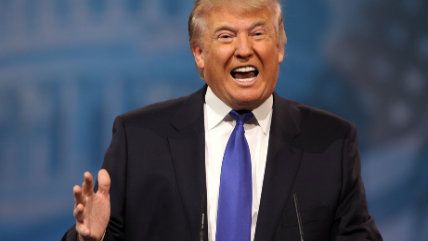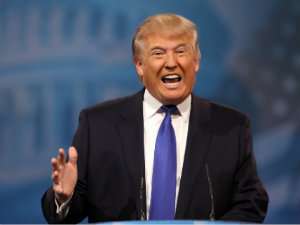Trump's Latest "America First" Executive Order Puts Taxpayers Last
"You better believe it."


President Trump has claimed that the "Buy American" portion of his recent executive order would at long last put American workers and producers first by encouraging the federal government to purchase more domestically produced material and manufactured goods.
But to the degree that this executive order does cut back on government purchases from "cheating" foreigners, the result will not be the spike in jobs and wages that Trump envisions, but instead a spike in US government spending with few discernable benefits for American workers or taxpayers.
This is because any tightening of "Buy American" regulations will likely just result in the federal government substituting their current purchases of relatively cheap foreign goods for their more expensive domestic equivalents.
So says Daniel Ikenson, Director of the Herbet A. Steifel Center for Trade Studies at the Cato Institute
"Any effort to restrict supply," he tells Reason "will result in a waste of tax payer dollars" by cutting out lower cost foreign alternatives.
And depending on what the Trump Administration's spending priorities are, this could wind up being incredibly wasteful, particularly considering Trump's ambitious plans for infrastructure spending.
Ikenson again: "If we're talking about a $1 trillion infrastructure project, we might only get $500 billion of infrastructure."
As it stands now, the laws governing the federal procurement process often require agencies to buy more expensive domestically produced materials.
Thankfully, these agencies are frequently able to get "public interest" exemptions to these laws when sourcing purchases abroad would save taxpayers money.
These waivers thus provide a useful workaround to the protectionism baked into current procurement laws, helping to ensure that federal funds are stretched as far as possible when being spent on projects like highways and bridges.
But to President Trump, this prudent dispensing of taxpayer dollars is both "excessive" and "reckless," resulting in "countless jobs and countless contracts" being lost to "cheap, subsidized, and low-quality foreign goods."
His executive order thus calls for federal agencies to report on the waivers to Buy American laws they currently grant, and to draw up plans to maximize their purchase of domestically manufactured goods and materials—particularly that pinnacle of US patriotism and pride, steel.
His executive order mentions steel a total of five times.
It also asks the Commerce Secretary Wilbur Ross—himself a former steel executive—to investigate the federal government's purchase of cheaper foreign steel to see if its cost advantage is the result of being dumped or "injuriously subsidized."
These provisions Trump says will lead to "new ships, bridges, tunnels and airplanes…constructed with American hands, American steel, and, yes, American tools." And far from having a deleterious effect on the budget, the administration is claiming that requiring agencies to spend more money through tightened "Buy America" provisions will actually have a positive fiscal impact.
"Buy American and Hire American polices lead to increased jobs and economic growth, higher wages, and a more robust tax base, and thereby offset any price or cost effects," one senior administration official told reporters with a straight face.
But this argument does not carry much weight with Ikenson given the size of the industries "Buy American" would benefit relative to those hurt by it.
"Steel," he points out "counts for .3 percent of GDP and employs 80,000 workers." By raising the price of steel to benefit those workers he says, "we are hurting downstream workers which employ 70 workers for every steel worker."
Whether or not that hurt will materialize however remains an open question.
Federal agencies aren't required to report on their plans to buy more American goods for another 150 days. And even when they do, it's still an open question of how much the administration will be willing to change, particularly once they start receiving pushback from business groups and contractors not eager to see their costs go up.
For that reason, many see this latest Executive order as a mostly cosmetic political exercise, aimed at ginning up the patriotic feelings in Trump's base.
That impression is not helped in the slightest by Trump's unveiling of his executive order, presented as it was in the shadow of a giant flag comprised of American made wrenches.
Nor is it helped by the nakedly political justifications used by administration officials in promoting the policy change.
Said one official: "Republican, Democrat, independent—it's just, boom, this is what America wants, and the President intends to give Buy American, Hire American to the American people."
Patriotism it seems, sells pretty easily. If only the same thing could be said for US steel.
Rent Free is a weekly newsletter from Christian Britschgi on urbanism and the fight for less regulation, more housing, more property rights, and more freedom in America's cities.
Editor's Note: As of February 29, 2024, commenting privileges on reason.com posts are limited to Reason Plus subscribers. Past commenters are grandfathered in for a temporary period. Subscribe here to preserve your ability to comment. Your Reason Plus subscription also gives you an ad-free version of reason.com, along with full access to the digital edition and archives of Reason magazine. We request that comments be civil and on-topic. We do not moderate or assume any responsibility for comments, which are owned by the readers who post them. Comments do not represent the views of reason.com or Reason Foundation. We reserve the right to delete any comment and ban commenters for any reason at any time. Comments may only be edited within 5 minutes of posting. Report abuses.
Please to post comments


The argument put forth by the administration would make sense if dollars spent on foreign steel, oil, and auto parts just got flushed down the drain. But by nature dollars don't just vanish. When they are held by foreign entities, they will be coming back to us one of three ways. They are used to purchase American goods (better for the economy than forcing domestic purchases, as both sides make what they are best at). They are used as capital investments in American businesses (which creates American jobs). Or they are just traded at a currency exchange, which enables us to offload the foreign currency we get from exports, making it possible to have an export industry at all.
The arguments for trade protectionism all work very hard to ignore these mechanisms and convince people that dollars in the hands of Chinese businessmen might as well have been stacked in a pile and burned.